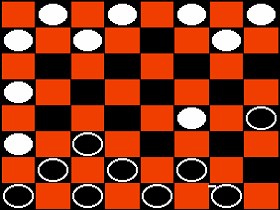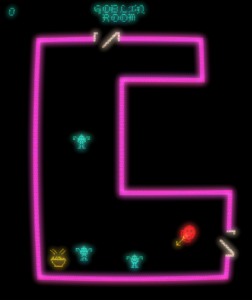 The Game: The classic game of strategy is faithfully reproduced on the Apple II. Two armies of twelve men each advance diagonally across the checkerboard, jumping over opponents and attempting to reach the enemy’s home squares to be crowned. Whoever still has pieces still standing at the end of the game wins. (Odessa Software, 1981)
The Game: The classic game of strategy is faithfully reproduced on the Apple II. Two armies of twelve men each advance diagonally across the checkerboard, jumping over opponents and attempting to reach the enemy’s home squares to be crowned. Whoever still has pieces still standing at the end of the game wins. (Odessa Software, 1981)
Memories: At the time of its release, Odessa Software’s Apple version of checkers was a reasonably big deal, since it had been given its “smarts” by one of the leading experts in programming computers to play chess and checkers.
David Slate‘s earliest experiments in computer chess were Big News almost a decade before; Slate’s Chess 4.0 (and its author) competed in the first-ever World Computer Chess Championships, held in Stockholm, Sweden in 1974. To say that Slate was something of  a rock star in the field of programming computers to play strategy games would be an understatement. But what kind of checkers game would Slate give Apple II owners?
a rock star in the field of programming computers to play strategy games would be an understatement. But what kind of checkers game would Slate give Apple II owners?
In a word: brutal. Anyone looking for an entertaining entry-level checkers game is likely to be trounced by this game, which seems to know what the player will be doing ten moves from now. Checkers plays a pretty long game, and of course human error is nonexistent: it can be a little bit discouraging. Each game ends with a text screen displaying every move – for most human players, it’s likely a final tally of failures.
Odessa’s merciless Checkers also has one other footnote in computer history: it’s one of the very few commercially-released software products which acknowledges the existence of, and announces its compatibility with, the Franklin ACE line of computers, which were some of the first Apple II “clones” to hit the market (in fact,  my very first computer was a Franklin ACE 1000). Since this happened long before computer and console makers embarked on an absolute lockdown on who could or couldn’t release software for their machines, and placed strictures on how it could be marketed (a product of the NES era, but ubiquitous in the 21st century), there wasn’t much Apple could do about it (something else that doesn’t happen much in the 21st century).
my very first computer was a Franklin ACE 1000). Since this happened long before computer and console makers embarked on an absolute lockdown on who could or couldn’t release software for their machines, and placed strictures on how it could be marketed (a product of the NES era, but ubiquitous in the 21st century), there wasn’t much Apple could do about it (something else that doesn’t happen much in the 21st century).

